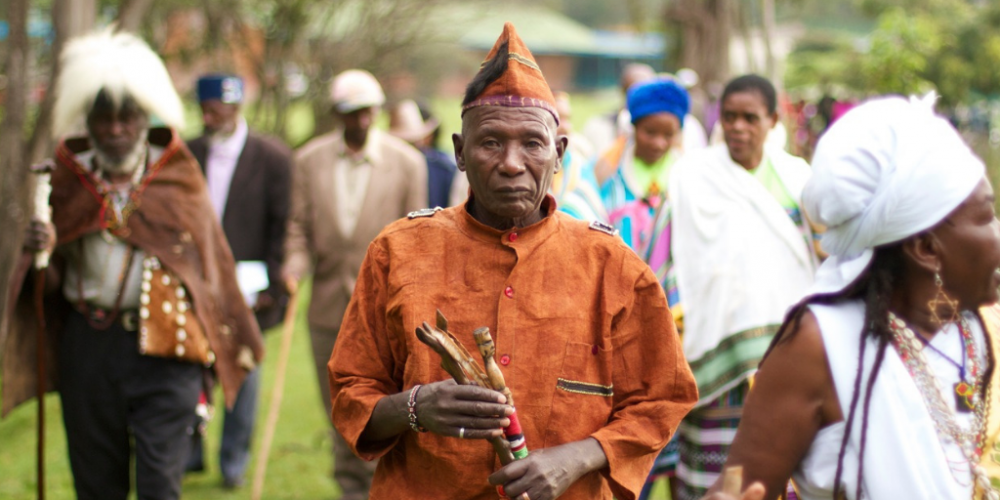In an article written for and published by NGOSource (September 12, 2018), Gaia’s Fiona Wilton describes the core of Gaia’s work with partner organisations, social movements and communities from around the planet- reviving indigenous knowledge and re‐connecting people with the Earth are at the heart of this work.
 Like strands woven together into a basket, life on Earth is made possible through a dynamic interaction of relationships weaving together. No one part can be understood by separating it from the whole, and the whole is greater than the sum of its parts.
Like strands woven together into a basket, life on Earth is made possible through a dynamic interaction of relationships weaving together. No one part can be understood by separating it from the whole, and the whole is greater than the sum of its parts.
For more than 30 years, the Gaia Foundation (Gaia) has been working to strengthen and re-weave this basket of life. A small, feisty organization based in north London, its holistic approach is guided by the understanding that we humans are an inextricable part of the dynamic web of life.
Working closely with indigenous communities and Earth defenders, from Africa to the Amazon, Gaia is committed to reviving bio-cultural diversity, regenerating healthy ecosystems and strengthening community self-governance for climate change resilience. Reviving indigenous knowledge and re‐connecting people with the Earth are at the heart of this work.
You can find out more about Gaia in their Story of Origin – the people, the places and the philosophy behind all they do – and their four main focus areas through their website, reports, films and animations:
- Seed, Food & Climate Change Resilience – Promoting regenerative agriculture, supporting small farmers, especially women, to enhance their indigenous knowledge and seed diversity, and to safeguard seed and food sovereignty for generations to come.
- Sacred Lands & Wilderness – Protecting sacred natural sites and territories, and the rights of traditional custodians, through legislation, policy, inter-generational learning, wilderness experience and habitat restoration.
- Earth Jurisprudence – Growing a global movement committed to systemic change through the philosophy and practice of Earth Jurisprudence, recognizing Nature as the primary source of law and ethics.
- Beyond Extractivism – Raising the voice of communities and social movements on the front line of struggles to protect land, water and life, and encouraging regenerative alternatives such a rewilding.
NGOsource’s Role
Gaia was introduced to NGOsource in 2014 through one of its US funders, the Swift Foundation, who funded the equivalency determination (ED) process.
Liz Hosken, Director, says “We realised the benefit immediately – now when we apply for funding from the U.S. for support to Gaia or our partners, the energy and time spent in carrying out due diligence is lifted. It establishes trust and transparency as US grantmakers can see that we have invested in securing an ED certificate from NGOsource, and it is a significant boost to ensuring donor diversification and financial sustainability for our organisation and programs. We refer all potential US funders to NGOsource, explaining how easy it is for them obtain an ED certificate.”
Swift Foundation remains a valued grantmaker, and two other US foundations have since requested EDs from NGOsource for Gaia.
ED in Action: Reviving Indigenous Knowledge for Seed, Food and Climate Change Resilience
Across Africa, it is thanks to US and European funding that Gaia and its network of local partner organizations – in Benin, Kenya, Ethiopia, Uganda, South Africa and Zimbabwe – can empower rural women farmers and their communities to revive and protect their traditional seed and knowledge and gain the confidence to stand up to external pressures. Through seed and knowledge revival they are carving out paths for food sovereignty and climate change resilience.
As Liz Hosken, Gaia’s Director, reminds us, “It is traditional farmers, especially women, who have the greatest depth of understanding of the rich diversity that exists in their fields, their kitchen gardens, in wild spaces near to their lands, and in sacred places. Growing climatic instability means that the role of women as custodians of seed and food is ever more critical, along with restoring the health of the wider ecosystem on which food systems depend – the forests, rivers, wetlands and other habitats for pollinators and wild relatives of domestic crops which can enrich crop diversity.”
ED certification enables US funders to support Gaia in carrying out training workshops and innovative techniques such as eco-cultural mapping, and the use of strategic spaces and the media to influence policy and the public on revalorising women as custodians of seed, food and traditional knowledge.[1] Last year, Gaia secured a landmark African regional policy resolution for the protection of sacred natural sites. This year, in October 2018, we will host a remarkable photographic exhibition, We Feed the World, elevating the voice of Africa’s rural women and other small farmers.
In the words of one of long-term partners in the Colombian Amazon, “There is a generosity and care, which characterises Gaia: seeing the value of people, of cultures, of different ways of thinking and of creating spaces. This is what makes Gaia very special.” Support channelled through NGOsource can help Gaia to continue this important work.
